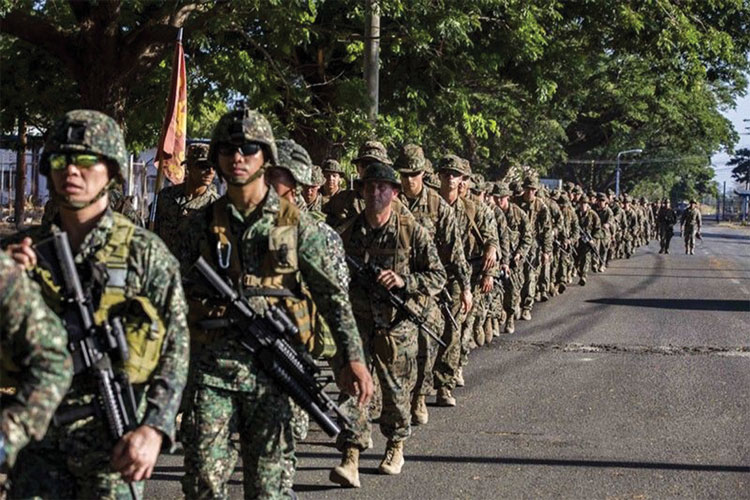by Joseph Peralta and Ritchel Mendiola
SENATE President Vicente Sotto III and Senate Minority Leader Franklin Drilon on Wednesday, June 3 both welcomed the move of Malacañang to suspend the termination of the Visiting Forces Agreement (VFA) between the United States and the Philippines.
The two senators reiterated that the petition filed by senators in the Supreme Court asking to affirm the chamber’s role in treaty termination will not be affected by the suspension of the VFA termination in separate interviews.

Senate President Sotto, who stated that the majority of senators prefer the retention and improvement of the VFA, told the Philippine Star that “the pending issue in the Supreme Court remains. We will still ask the SC whether or not the abrogation (of treaties) must have the concurrence of the Senate, the concurring body.”
Sotto added he would still press for a review of the military pact between the two countries.
Senator Drilon, who welcomed what he termed as the “sudden policy change” of the Philippine government, said to the Inquirer, “This turnaround does not affect the case we filed before the Supreme Court. The petition we filed is for declaratory relief and mandamus where we asked the Supreme Court to uphold the power of the Senate over treaty termination. The fact that the VFA is reinstated will not render our case moot and academic. The case stands.”
“The unhampered implementation of the VFA will serve the interest of our country, particularly with the preservation of our rights over parts of the West Philippine Sea,” Drilon added.
“The abrupt abrogation of the VFA last February as initiated by the President – which was done amid the increasing aggressiveness and the bullying of China – is disadvantageous to us. What the country truly needs is a stable foreign policy that promotes our interest,” the Senate Minority Leader further stated.
It was on Tuesday, June 2 that Foreign Affairs Secretary Teodoro Locsin Jr. announced that the Philippines has suspended the termination of its Visiting Forces Agreement with the United States “in light of political and other developments in the region.”
“I issued this diplomatic note to the U.S. ambassador. It has been received by Washington and well at that. The note is self-explanatory and does not require comment except from me,” he said in a tweet.
“The abrogation of the Visiting Forces Agreement has been suspended upon the President’s instruction,” Locsin added.
In the diplomatic note attached to Locsin’s tweet, it said: “In light of the political and other developments in the region, the termination of the Agreement between the Government of the Republic of the Philippines and the Government of the United States Regarding the Treatment of the United States Visiting Forces Visiting the Philippines…is hereby suspended.”
The note also said that the suspension shall start on an even date and shall continue for six months — though it can be extended for another half a year.
“After which, the tolling of the initial period in Note Verbale No. 20-0463 dated 11 February 2020 shall resume,” it added.
On February 11, the Philippines sent a notice to Washington that terminated the defense agreement.
The United States, for its part, welcomed the Philippines’ decision to suspend the abrogation of the VFA for now.
“On June 1, the Government of the Philippines notified the U.S. Embassy in the Philippines of its decision to suspend termination of the Visiting Forces Agreement,” the embassy said Tuesday.
“The United States welcomes the Philippine government’s decision. Our long-standing alliance has benefited both countries, and we look forward to continued close security and defense cooperation with the Philippines,” it added.
Meanwhile, political analysts see the turnaround by the Philippine government as a sign of wariness, even as China is seen as extending its military might in the South China Sea in an article published in The New York Times. They also see this as a strategic gain for the U.S., given that the South China Sea is a vital maritime shipping route.
“In light of China’s continued assertion of its historic rights in Vietnamese and Malaysian waters over the last year, Manila may have concluded that its previous rapprochement with Beijing would not protect Philippine interests,” said M. Taylor Fravel, a political-science professor who is director of the Security Studies Program at the Massachusetts Institute of Technology, in the same article.
Bonnie Glaser, director of the China Power Project at the Center for Strategic and International Studies in Washington, said it remained unclear how the move by the Philippines to at least temporarily prolong the pact, known as the Visiting Forces Agreement, would affect the country’s South China Sea policy. But she also saw it as a setback for China.
“Beijing has long sought to weaken U.S. alliances, and has benefited from the friction in recent years in U.S.-Philippine relations,” she said. “So a decision by Manila to suspend plans to terminate the VFA will be seen as contrary to Chinese interests.”
The Philippines is one of several territorial claimants in the South China Sea, which includes Vietnam, Malaysia and Taiwan.






